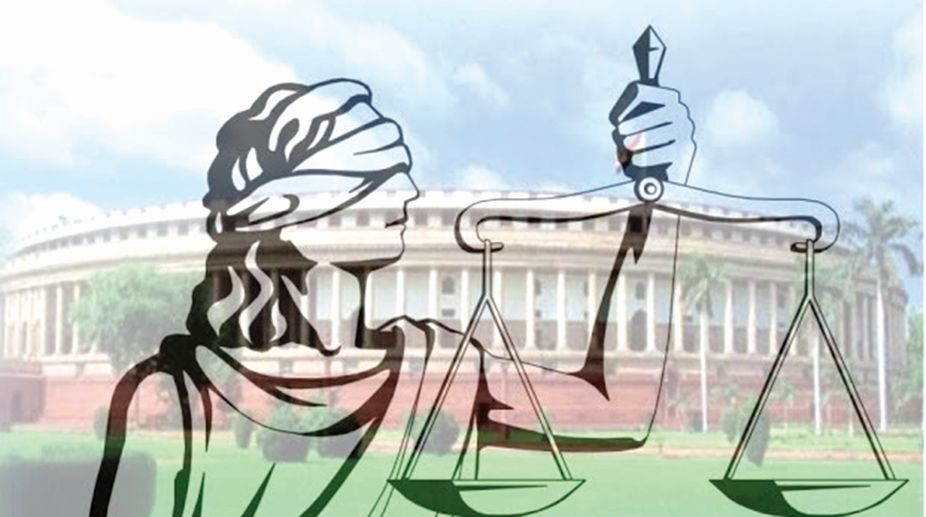Teachers’ job scam: CBI tells court of nexus
The CBI today submitted in Calcutta High court that the teachers’ recruitment scam at the primary level was a fallout of an unholy nexus between Tapas Mandol and Kuntal Ghosh
The Government and to an extent the judiciary are responsible for the situation where judges’ appointments are held up and the backlog in courts mounts, say Pratheek Reddy and Armin Rosencranz

Bureaucracy- judiciary in India
Andrew Jackson, the seventh president of the United States, once said, “All the rights secured to the citizens under the Constitution are worth nothing…except guaranteed to them by an independent and virtuous Judiciary.”
India, which borrowed its constitutional fundamental rights largely from the US, has proved the importance of this statement on several occasions – by moving away from judicial independence.
The Central Government is either sending back or sitting on the recommendations cleared by the Collegium – the Chief Justice of the Supreme Court and his four senior-most colleagues.
Advertisement
Many high courts are working with less than half of their sanctioned strength. One example is the Calcutta High Court with only 33 judges while the sanctioned positions are 72.
Last month, the Calcutta High Court Bar Association called for a five-day cease work as a protest against such vacancies. The cease work continues and the decision to review it will be taken on 19 April.
An examination of the Collegium’s recommended appointments suggests that the Centre’s modus operandi is to block the appointment of any lawyer or elevation of any judge who has taken a pro-citizen stance in the past. In September last year, a brief outrage emerged in the Bar at Gujarat and Karnataka High Court after Justice Jayant Patel resigned following his transfer from the Karnataka High Court to the Allahabad High Court.
Was this transfer, denying the Judge his soon to be received Chief Justiceship, a retaliation for his decision directing a CBI investigation into the Ishrat Jahan fake encounter case, leading to the arrest of several police officers in Gujarat?
In January this year, the Centre sent the recommendation for elevating Uttarakhand High Court Chief Justice K.M. Joseph back to the Collegium. Widespread speculation in the legal fraternity suggested the reason to have been the Judge’s 2016 decision quashing President’s Rule in Uttarakhand. Similar patterns can be identified in most other objections to judges’ appointments by the Central Government.
A lay citizen who does not understand this dynamic between the judiciary and the executive would tend to regard the country’s judiciary as being solely responsible for the huge pendency of cases.
This made the then Chief Justice T.S. Thakur break down before Prime Minister Narendra Modi while speaking about the overworked judiciary and the loss of the common man’s trust in the institution.
While Prime Minister Modi instantly promised to resolve the situation with all seriousness, the state of affairs looks just as desolate today. India’s Constitution is based on the doctrine of separation of powers.
Providing for a Westminster model of government, an idea borrowed from the United Kingdom, the Constitution does not mandate a strict separation of powers. The executive is allowed a narrow involvement in the working of the judiciary.
However, being the biggest litigant in the country, and having the power to sit on the Collegium’s recommendations, the government may allow only such appointments as it wants to the bench. This obliterates party-detachment, which is essential for maintaining judicial independence.
The judiciary too is far from being innocent in this regard. Political influences prevalent in the judiciary contribute to the politics of non-appointment. For instance, in a letter to the Chief Justice of India, Justice Jasti Chelameswar of the Supreme Court alluded to an “unwarranted intimacy” between one of his colleagues and a Chief Minister of a state.
He pointed to the almost identical letters sent by the Chief Minister and the Judge against the elevation of the same named five advocates in a pool of six recommendations.
For reasons including the above, Justice Chelameswar publicly protested against the secretive manner in which Collegium meetings are held, with no minutes of the meeting recorded
. In both his dissenting opinions in the National Judicial Appointments Commission case (2015) and his separate opinion in Calcutta High Court Justice C.S. Karnan’s criminal contempt case (2017), he repeatedly pointed to the lack of transparency and accountability in the Collegium’s appointments process.
By downgrading the institution of the judiciary to such political gameplay, the executive may find a degree of immediate relief. However, such relief is at any rate indefensible by a valid separation of powers argument and certainly undermines the structure of India’s democracy. Effective separation of powers is as important to sustain judicial independence as is judicial independence to safeguard the democracy in the country.
Dr B.R. Ambedkar’s prophetic words apply strongly today: In his last speech in the Constituent Assembly, Dr. Ambedkar observed that should there occur a landslide, India may retain democracy in form but not in substance.
While the Indian executive has left the questions about its actions regarding judges’ appointments unanswered, the judiciary is clearly not absolved of politicising some of its judgments.
The writers are, respectively, a fourth-year law student and a professor of law at the Jindal Global University, Sonipat.
Advertisement